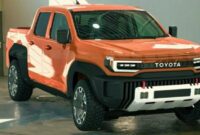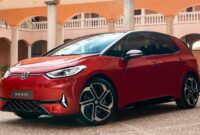The Toyota Hilux is a compact truck that is currently not available in the United States but is one of the best-selling small pickup trucks worldwide. Now in its eighth generation, Hilux offers four and six-cylinder engine options that differ depending on the region. So far there hasn’t been an all-electric model, but it looks like a battery-powered model might be coming in the future. And this isn’t just an assumption or rumor as Toyota has just unveiled a prototype of the Hilux electric truck, likely foreshadowing the upcoming production model.
The Japanese manufacturer celebrated its 60th anniversary in Thailand where a grand ceremony was held to mark the anniversary. As part of the celebrations, Toyota is showing its so-called Hilux Revo BEV Concept in front of an audience for the first time, although it is not yet ready to provide detailed information about the zero emission truck. All we have for now is one official image and unconfirmed rumours.
The concept truck was presented on stage by Akio Toyoda, President and CEO of Toyota Motor Corporation, hinting that at least some EV truck development work is being done in Thailand, where the Hilux is a very popular vehicle. Toyoda, however, did not provide technical specifications for the battery-powered truck, which shares the stage with the IMV Concept 0, a prototype light commercial vehicle. Interestingly, Toyoda said in his speech that “BEVs are not the only way to achieve the goal of global carbon neutrality.”
Recently, Toyota also announced it has started working on a hydrogen powered Hilux after receiving funding from the UK Government through the Advanced Propulsion Center (APC) for the development of zero emission vehicles. Not much else is known at this time, but Toyota will convert existing Hilux trucks into fuel cell electric vehicles using its own hydrogen technology from the second generation. This hydrogen powertrain can be found under the hood of the Mirai and in the Hilux FCEV, the hydrogen tanks will be stored under the cabin and the fuel cell stack will replace the conventional internal combustion plant in the engine bay.




